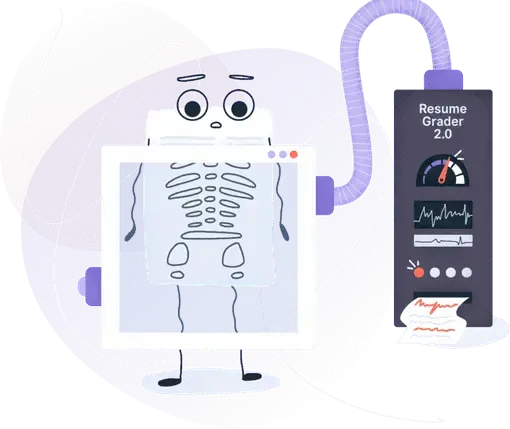Statistical Analysis Skills: Example Usage on Resumes, Skill Set & Top Keywords in 2025
Including statistical analysis skills on your resume signals to recruiters that you have a keen ability to interpret data and make informed decisions. Dive into the guide below for insights on enhancing your resume and exploring alternative skill phrases.


Is your resume ATS-friendly?
Drop your resume here or upload a file to find out if the skills in your resume are readable by an ATS.
Statistical analysis is a skill that involves collecting, examining, and presenting data to find patterns, trends, and relationships. This skill is crucial for many industries because it helps companies make informed decisions based on concrete evidence. Adding statistical analysis to your resume shows potential employers that you are capable of handling data, making sense of numbers, and providing insights that could benefit their business. It's a desirable trait in a candidate because it suggests that you have the ability to process information thoughtfully and come up with solutions based on data.
However, listing statistical analysis as a skill on your resume has some drawbacks. If your experience with statistical analysis is limited or outdated, it might not impress employers who need advanced or specialized expertise. Furthermore, simply stating that you have statistical analysis skills is vague—employers will look for more detailed examples or proof of your abilities. To make your resume stand out, it's better to include specific projects or roles where you applied statistical analysis successfully. Such details provide a clearer picture of your capabilities and the value you can bring to an organization.
In this article, you will learn:
- How to showcase specific instances where you've successfully used statistical analysis.
- Common pitfalls of including statistical analysis on your resume and how to avoid them.
- Synonyms and alternate ways to present statistical analysis skills on your resume.
Misusage of Statistical Analysis on Resumes
Statistical analysis is a valuable skill that can significantly boost your resume's appeal to potential employers. However, if misrepresented, it can undermine your credibility. It's important to convey your proficiency in this area accurately without overinflating your experience or the impact of your work. Here are three examples of how statistical analysis skills can be incorrectly presented on a resume:
- In the summary section: "Exceptional statistical analysis guru who revolutionizes data interpretation for leading companies" (This overstates expertise and does not reflect specific contributions or experience.)
- In the experience section: "Used statistical analysis to double company revenue in one year" (This claim is unrealistic and likely not solely attributable to the use of statistical analysis.)
- In the achievements section: "Awarded employee of the month for innovative use of statistical analysis in every project" (This is vague and does not detail how the skill was applied or what the outcomes were.)
How to Demonstrate Statistical Analysis Skills on Your Resume
- Highlight your experience by listing specific projects where you applied statistical methods to analyze data, outlining the techniques you used and the conclusions drawn from your analysis.
- Showcase your proficiency with statistical software by mentioning tools you're proficient in, such as SPSS, R, SAS, Stata, or Python's statistical libraries.
- Include any relevant coursework or certifications that demonstrate formal education in statistics, such as a degree in statistics or mathematics, or specific courses like regression analysis or machine learning.
- Quantify your achievements whenever possible, for example by explaining how your analysis led to a cost reduction of 10% or improved sales by 15%.
- Detail any experience you have with designing experiments or surveys, indicating your ability to collect and analyze data effectively and efficiently.
Example 1: Demonstrate statistical analysis in the experience section
- •Analyzed user engagement data across multiple platforms, revealing a 15% increase in user retention.
- •Conducted A/B testing for website layout changes which improved click-through rates by 20%.
- •Created data visualization dashboards that tracked key performance indicators, assisting in strategic decision-making.
- •Developed new statistical models that predicted patient outcomes with 85% accuracy, guiding treatment plans.
- •Implemented surveys and analyzed feedback for over 2000 patients, enhancing patient care quality.
- •Streamlined data collection processes, resulting in a 30% reduction in time spent on data entry tasks.
- •Oversaw market trend analysis for over 30 clients which led to informed and strategic market entry.
- •Enhanced client reports with custom data visualizations, improving client understanding and satisfaction.
- •Conducted competitive analysis to determine potential market share, aiding clients in resource allocation.
- Each bullet point clearly demonstrates an ability to analyze data and contribute to business goals, providing valuable context.
- Specific numbers and percentage changes show measurable success and the direct impact of the work.
- Descriptive language conveys the nature of work and achievements without overused jargon.
- Diverse experiences from internships to focused roles show growth and ability to adapt to different work environments.
- The use of recent dates and reputable companies gives the resume current relevance and credibility.
Example 2: Demonstrate statistical analysis in the summary section
- The summary emphasizes a solid decade of work in data analysis, signaling dedication and depth of experience.
- It mentions specific technical skills relevant to the job, showing expertise without resorting to unexplained jargon.
- Details about a significant career milestone provides concrete evidence of the applicant's ability to make an impact using their skills.
- Phrasing like "proven track record" and "real-results" instead of buzzwords convey competence confidently.
- The focus on aligning with team objectives rather than self-praise shows a team-oriented mindset.
- It uses clear, direct language that succinctly communicates the applicant's qualifications and enthusiasm.
Example 3: Demonstrate statistical analysis in the achievements section
- Uses clear numbers to show measurable results.
- Focuses on specific achievements with detailed outcomes.
- Demonstrates the actual impact made in previous roles.
- Highlights skilled use of data without resorting to buzzwords.
- Each title is concise while the descriptions expand with relevant detail.
- Constructs a narrative of improvement and success through statistics.
What Are the Relevant Certifications for Statistical Analysis Skills on Resume
Enhance your statistical analysis capabilities and showcase your expertise with these respected certifications:
The top 5 certifications for gaining statistical analysis skills expertise:
This certification focuses on the application of predictive analytics within the insurance and financial industries, providing you with in-depth skills in data preparation, modeling, and deployment.
Aiming primarily at finance professionals, this program equips you with practical knowledge in mathematical and quantitative finance, including statistical methods used in risk management and trading.
Through this certificate, you will gain proficiency in data analysis, including statistical methods, data visualization, and machine learning, helping you transform data into actionable insights.
Ideal for professionals enhancing their statistical skills, this certificate covers deep theoretical foundations and applications of statistics in various fields such as medicine, business, and science.
A master's degree program offering advanced training in analytics and statistical methods, this qualification prepares you to tackle complex data analysis challenges and leads to more senior positions in analytics.
Top skills people add together with statistical analysis skill on resume:
Data Analysis
Statistical Modeling
Data Mining
R Programming
Python
SAS Programming
Machine Learning
Data Visualization
SQL
Big Data Analytics
Analytical Thinking
Problem Solving
Attention to Detail
Critical Thinking
Communication
Organizational
Time Management
Adaptability
Teamwork
Continuous Learning
Decision Making
Most Relevant Jobs for Statistical Analysis Skills
Statistical analysis skills are crucial for numerous professions where data-driven decision-making and data interpretation are key responsibilities. Individuals with these abilities play a vital role in making sense of complex data to inform strategy, solve problems, and extract actionable insights. The applications of statistical analysis are broad, ranging from business, healthcare, to government, making these skills highly valuable in the job market.
- Data analyst
- Statistical consultant
- Market researcher
- Biostatistician
- Operations research analyst
- Financial analyst
- Policy analyst
- Economist
- Data scientist
- Quantitative researcher
Key Takeaways
- Statistical analysis skills improve your resume by demonstrating your ability to interpret data and make data-driven decisions.
- Avoid misusing statistical analysis by thoroughly checking your work for common errors such as ignoring sample size or cherry-picking data.
- Showcase statistical analysis skills on your resume by including specific examples of past work, relevant projects, or coursework.
Make one that's truly you.




